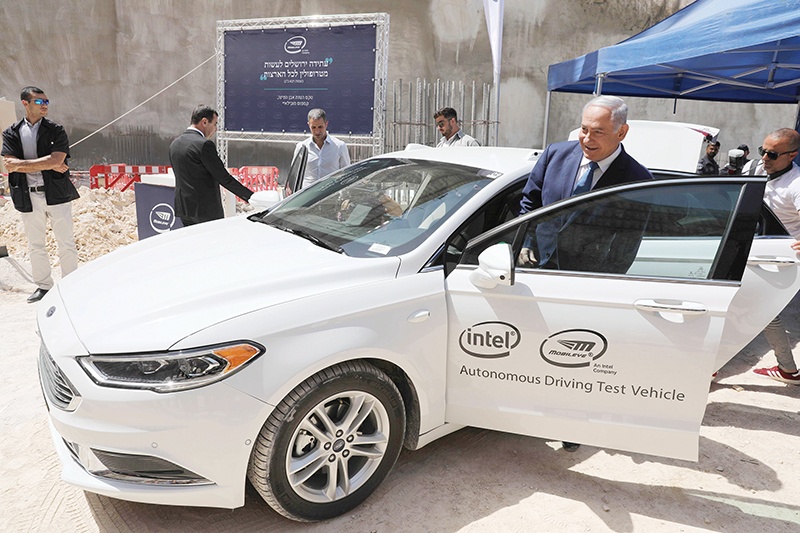
BEIRUT/JERUSALEM:
Hezbollah is preparing a "calculated strike" against its enemy Israel
after suspected Israeli drones crashed in Beirut but it aims to avoid a new
war, two sources allied to Hezbollah told Reuters yesterday. A reaction
"is being arranged in a way which wouldn't lead to a war" that
Hezbollah does not want, one of the sources said. "The direction now is
for a calculated strike, but how matters develop, that's another thing."
Israeli Prime
Minister Benjamin Netanyahu said yesterday Hezbollah leader Sayyed Hassan
Nasrallah should "calm down" after Nasrallah said the Iranian-backed
movement would respond to the crash of two drones in a Beirut suburb. In a
speech on Sunday, Nasrallah described the drones, including one that had
exploded, as the first Israeli attack in Lebanon since the two sides fought a
month-long war in 2006. "I say to the Israeli army on the border from
tonight, stand guard. Wait for us one, two, three, four days," Nasrallah
said.
One of the drones
exploded near the ground, causing some damage to Hezbollah's media center in
the southern suburbs of the capital which it dominates. Israeli officials have
declined to comment when asked if Israel was responsible. "I heard what
Nasrallah said. I suggest to Nasrallah to calm down. He knows well that Israel
knows how to defend itself and to pay back its enemies," Netanyahu said in
a speech.
Precise details
about where the drones were fired from have yet to emerge. Hezbollah has said
the two drones were rigged with explosives after its experts took apart the
first drone. Asked if Israel attacked any ground targets in Lebanon in recent
days, Regional Cooperation Minister Tzachi Hanegbi, a member of Netanyahu's
security cabinet, told Israeli Army Radio: "We of course did not respond
to the accusations leveled at us. On their face, these things seem weird and
intriguing. The media have reported this fact - that these are allegations that
have no basis."
Lebanon's Higher
Defense Council, which includes the president, prime minister and army
commander, convened on Tuesday and said the Lebanese have "the right to
defend themselves against any attack". Israel deems the heavily armed
Shiite Hezbollah movement the biggest threat across its border. In their 2006
war nearly 1,200 people, mostly civilians, died in Lebanon and 158 people died
in Israel, mostly soldiers.
Regional sources
say that Israel and Hezbollah have formed an unwritten understanding that while
they can exchange fire within Syria, any attacks within Lebanon or Israel are
to be avoided lest they escalate to war. Israel has grown alarmed by the rising
influence of its foe Iran during the war in neighboring Syria, where Tehran and
Hezbollah provide military help to Damascus.
Tehran also has
wide sway in Iraq, where a grouping of Iraq's mostly Shi'ite Muslim
paramilitary groups, many of which are backed by Iran, have blamed recent
blasts at their weapons depots and bases on the United States and Israel.
Lebanese President Michel Aoun said on Monday his country had a right to defend
itself, likening Israeli drone strikes to a "declaration of war".
Late on Saturday, Israeli air strikes killed two Lebanese Hezbollah fighters in
Syria.
Israel, which
regularly strikes Iranian-linked targets in Syria, said it hit a compound
controlled by Iran's Revolutionary Guards Quds force, accusing it of planning
killer drone attacks. Netanyahu also issued warnings to Lebanon and Qassem
Soleimani, commander of the Quds force, which the Israeli leader said aspires
to destroy Israel. "Watch what you say, and moreover be careful about what
you do," Netanyahu said.
Andrea Tenenti,
spokesman for the United Nations Interim Force in Lebanon (UNIFIL) that patrols
the border with Israel, said the situation in the area remains quiet.
"UNIFIL continues to work with the parties to ensure that there are no
misunderstandings or incidents that may endanger the cessation of
hostilities," Tenenti told Lebanon's state news agency NNA, referring to a
UN Security Council resolution that called for an end to the fighting in 2006.
In public
comments during a visit on Sunday to Israel's north, where he met army
commanders, Netanyahu appeared to hold out the prospect of targeting Lebanon
directly for attack if Hezbollah struck Israel. "Any country that allows
its territory to be used for aggression against Israel will face the
consequences, and I repeat: the country will face the consequences," he
said. - Reuters










